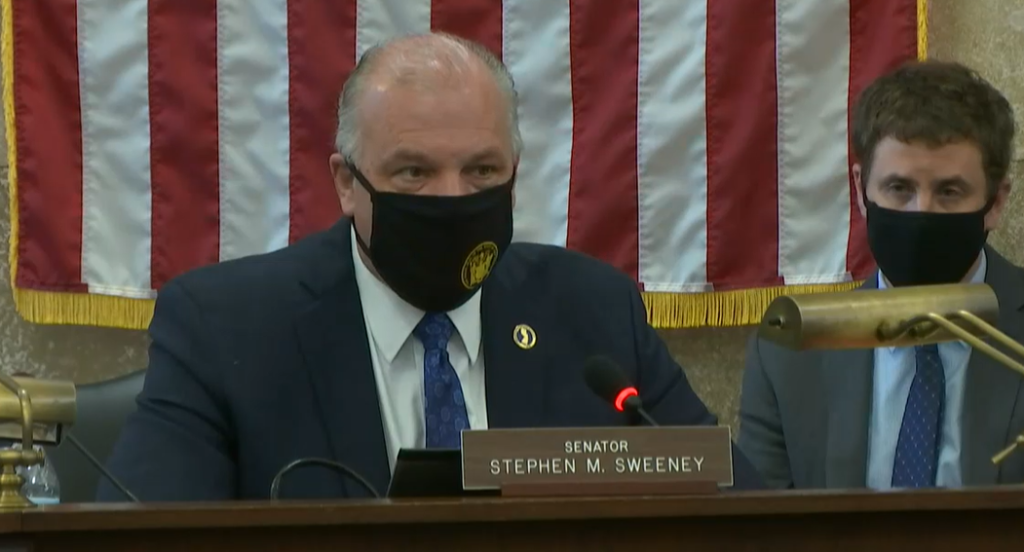Sweeney-Vitale Bill Requiring Infection Prevention Plans for Nursing Homes Advances

Sweeney-Vitale Bill Requiring Infection Prevention Plans for Nursing Homes Advances
Companion Bill Would Create Infection Control Training for Nurses
Trenton – The state would develop an infection prevention and control plan for nursing homes according to legislation authored by Senate President Steve Sweeney and Senator Joe Vitale that gained committee approval today.
The bill, S-3032, would require the New Jersey Department of Health to assess infection control and prevention policies and develop a statewide plan to improve existing systems. A companion measure, S-3031, would have state health officials develop infectious disease instructional programs for nurses who work in long-term care facilities.
Both bills were advanced by the Senate Health, Human Services and Senior Citizens Committee.
“We need a long-term strategy to ensure the nursing home industry in New Jersey is focused on the safety of residents and caregivers as well as the quality of services the facilities provide,” said Senator Sweeney (D-Gloucester/Salem/Cumberland). “This strategy should include design and construction standards for new facilities and for those undergoing significant modifications. The infrastructure has to promote and facilitate safe conditions so the practices and procedures are effective.”
About one third of New Jersey’s nursing homes were cited for infection control deficiencies in 2017, according to Manatt Health’s review of the state’s long-term care industry.
“While it is true that the pandemic was unprecedented, the tragic fact is that nursing homes were unprepared and unequipped to control the spread of the infection or mitigate its consequences,” said Senator Vitale (D-Middlesex), the chairman of the Health Committee. “The pandemic revealed cracks in the system that left our most vulnerable populations exposed to a deadly virus. A statewide assessment will help provide the information we need to put in place infection control and prevention practices to better protect the health and safety of the residents and workers in New Jersey’s long-term care facilities.”
Based on the findings of the assessment, the improvement plan would be designed to prevent, contain and control the outbreak or spread of infectious diseases. The plan would incorporate best practice standards in other states and establish specific goals and timelines for improvements that take into account the age of the facilities, the availability of land for expansion or new construction, the costs of improvements, and the authorizations that would be required.
The legislation lays out essential standards for review, including:
- A count of the total number of single-resident rooms in nursing homes, the percentage of beds that are utilized in single-resident rooms, and a review of the ability of nursing homes to expand single room capacity;
- A survey of the maintenance status of heating, ventilating, air conditioning, and refrigeration systems in nursing homes;
- A study of the utilization of negative pressure rooms and other physical plant features intended to increase infection control and prevention capability; and,
- Any other infrastructure-related considerations recommended by the New Jersey Task Force on Long-Term Care Quality and Safety.
The department would be required to consult with the nursing home industry, including for-profit and non-profit facilities, groups representing direct care providers and support staff in nursing homes, resident advocates, and the families of residents.
The companion bill would have the Department of Health work with the Association for Professionals in Infection Control and Epidemiology to develop an infection prevention course specifically designed for registered nurses and certified nurse aides employed in long-term care facilities.
Under the bill, the Health Department and the Board of Nursing would review the nursing curriculum to develop methods to encourage nurses to enroll in post-acute care residency programs and determine if the curriculum should be modified to better prepare them to work in the field. It would also require the department to review the certification curriculum for certified nurse aides and to work with the long-term care industry to develop a pilot program to develop standards for their professional advancement.









